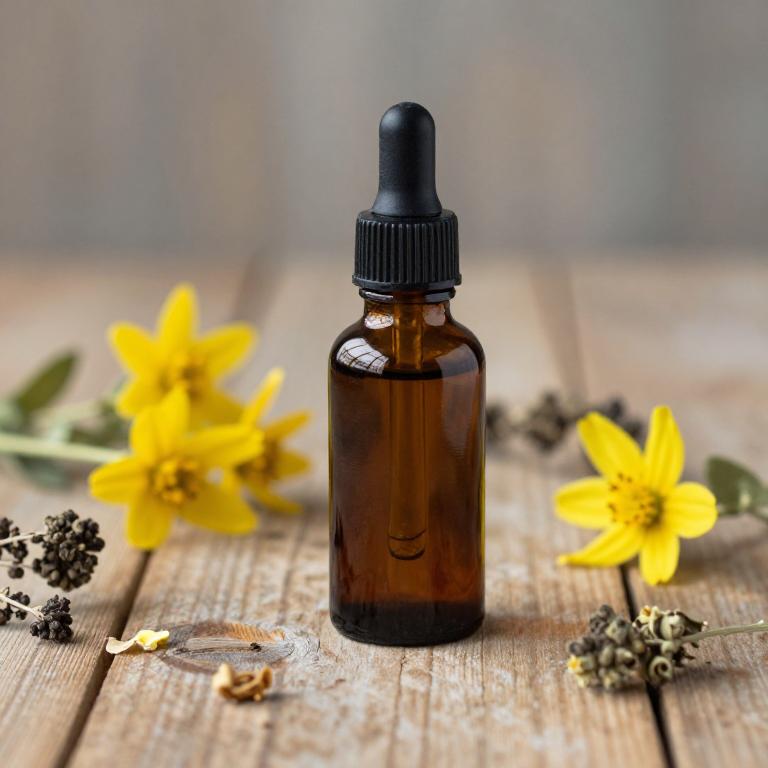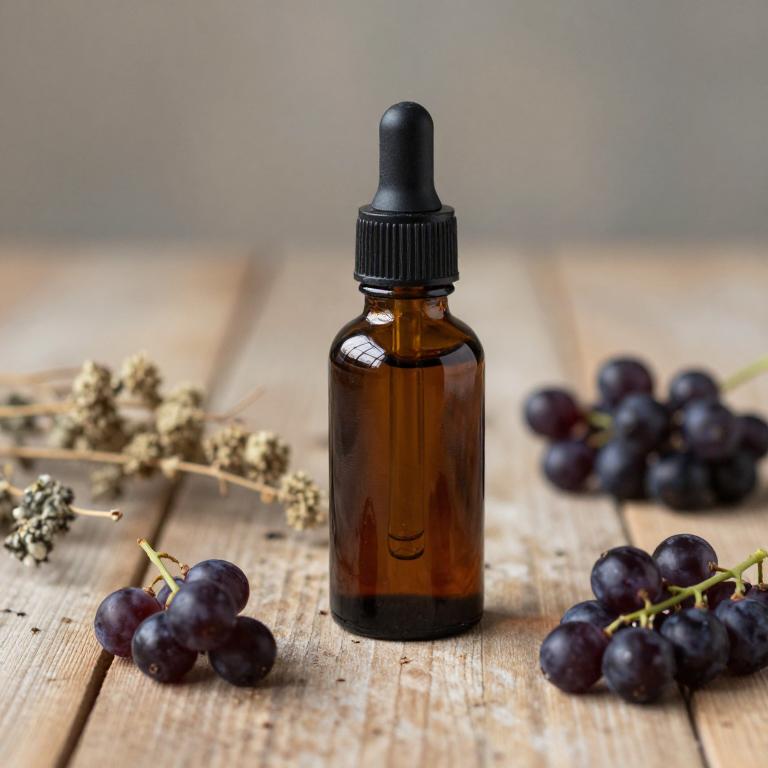10 Best Herbal Tinctures For Neck Pain

Herbal tinctures are concentrated liquid extracts made from various plant-based ingredients, often used to address a range of health concerns, including neck pain.
These tinctures typically contain herbs such as arnica, willow bark, turmeric, and ginger, which are known for their anti-inflammatory and analgesic properties. When applied topically or taken orally, these herbal tinctures can help reduce muscle tension, alleviate pain, and promote healing in the neck area. They are often preferred for their natural composition and fewer side effects compared to synthetic pain medications.
However, it is important to consult with a healthcare professional before using herbal tinctures to ensure safety and appropriateness for individual health conditions.
Table of Contents
- 1. St. john's wort (Hypericum perforatum)
- 2. Mountain arnica (Arnica montana)
- 3. Blessed thistle (Cnicus benedictus)
- 4. Salvia (Salvia officinalis)
- 5. Chaste tree (Vitex agnus-castus)
- 6. Yarrow (Achillea millefolium)
- 7. Stinging nettle (Urtica dioica)
- 8. Turmeric (Curcuma longa)
- 9. Echinacea (Echinacea purpurea)
- 10. Common grape (Vitis vinifera)
1. St. john's wort (Hypericum perforatum)

Hypericum perforatum, commonly known as St. John's Wort, is a herbal remedy that has been traditionally used for its potential anti-inflammatory and analgesic properties.
When prepared as a tincture, it may be used to alleviate symptoms of neck pain by reducing inflammation and soothing muscle tension. While some studies suggest that hypericum perforatum may have mild pain-relieving effects, more research is needed to confirm its efficacy for this specific condition. It is typically taken orally in diluted form, though topical applications may also be considered.
As with any herbal remedy, it is important to consult with a healthcare professional before use, especially if you are taking other medications, as it can interact with certain drugs.
2. Mountain arnica (Arnica montana)

Arnica montana herbal tinctures are commonly used to alleviate neck pain due to their anti-inflammatory and analgesic properties.
These tinctures are typically made by soaking the dried roots and rhizomes of the arnica plant in alcohol, creating a potent topical remedy. When applied to the skin, arnica tinctures can help reduce muscle tension, bruising, and inflammation associated with neck strain or injury. However, it is important to note that arnica should not be ingested and may cause skin irritation in some individuals.
As with any herbal treatment, it is advisable to consult a healthcare professional before use, especially if you have a history of allergies or are taking other medications.
3. Blessed thistle (Cnicus benedictus)

Cnicus benedictus, also known as blessed thorn, is a traditional herbal remedy that has been used for centuries to address various health issues, including neck pain.
Its tinctures are typically prepared by soaking the dried plant material in alcohol, which extracts its active compounds such as flavonoids and essential oils. These compounds are believed to possess anti-inflammatory and analgesic properties, making them potentially beneficial for reducing inflammation and pain in the cervical region. Some herbalists recommend using Cnicus benedictus tinctures as a natural alternative or complement to conventional treatments for chronic neck pain.
However, it is important to consult with a healthcare professional before using this or any herbal remedy to ensure safety and appropriateness for individual health conditions.
4. Salvia (Salvia officinalis)

Salvia officinalis, commonly known as sage, has been traditionally used for its medicinal properties, and its herbal tinctures are increasingly being explored for their potential benefits in alleviating neck pain.
These tinctures are typically prepared by soaking the dried leaves of the plant in alcohol, allowing the active compounds to be extracted for use. Sage contains compounds such as rosmarinic acid and flavonoids, which may have anti-inflammatory and analgesic effects that could help reduce discomfort associated with neck pain. Some studies suggest that topical application of sage tinctures may improve circulation and muscle relaxation, potentially easing tension in the neck area.
However, while preliminary evidence is promising, more clinical research is needed to fully understand its efficacy and safety for treating neck pain.
5. Chaste tree (Vitex agnus-castus)

Vitex agnus-castus, commonly known as chaste tree, has been traditionally used in herbal medicine for its potential to support hormonal balance and alleviate various physical symptoms.
Herbal tinctures made from Vitex agnus-castus are often used to address inflammation and muscle tension, which can contribute to neck pain. While scientific research on its direct effects on neck pain is limited, some studies suggest that its anti-inflammatory and analgesic properties may help reduce discomfort. Many individuals use Vitex tinctures as a complementary therapy alongside conventional treatments for chronic neck pain.
However, it is important to consult with a healthcare professional before starting any new herbal remedy to ensure safety and appropriateness for individual health conditions.
6. Yarrow (Achillea millefolium)

Achillea millefolium, commonly known as yarrow, is a traditional herbal remedy that has been used for centuries to address various health concerns, including inflammation and pain.
When prepared as a tincture, Achillea millefolium may offer targeted relief for neck pain by reducing inflammation and improving circulation in the affected area. The tincture is typically made by soaking the dried herb in alcohol, allowing the active compounds to be extracted for enhanced bioavailability. Some individuals use it as a complementary therapy alongside conventional treatments for chronic neck pain.
While generally considered safe, it is important to consult a healthcare professional before using yarrow tinctures, especially if you have existing health conditions or are taking other medications.
7. Stinging nettle (Urtica dioica)

Urtica dioica, commonly known as stinging nettle, has been traditionally used in herbal medicine for its anti-inflammatory and analgesic properties.
When prepared as a tincture, Urtica dioica can be applied topically to the skin for localized relief from neck pain. The tincture is typically made by soaking the dried leaves in alcohol, allowing the active compounds to infuse into the solution. This form of treatment is often favored for its natural composition and minimal side effects compared to pharmaceutical alternatives.
While some studies suggest that topical applications of nettle tinctures may help reduce inflammation and muscle tension in the neck, it is recommended to consult a healthcare professional before use, especially for chronic or severe pain conditions.
8. Turmeric (Curcuma longa)

Curcuma longa, commonly known as turmeric, contains curcumin, a compound known for its potent anti-inflammatory and antioxidant properties.
Herbal tinctures made from Curcuma longa are often used as a natural remedy for various ailments, including neck pain, due to their ability to reduce inflammation and muscle tension. When applied topically or taken internally, these tinctures may help alleviate discomfort associated with conditions like cervical arthritis or muscle strain. However, it is important to consult a healthcare professional before using turmeric tinctures, as they may interact with certain medications or have side effects in some individuals.
Overall, while curcuma longa tinctures show promise in managing neck pain, their effectiveness can vary, and they should be used as part of a comprehensive treatment plan.
9. Echinacea (Echinacea purpurea)

Echinacea purpurea herbal tinctures are traditionally used for their potential anti-inflammatory and immune-boosting properties, though their effectiveness for neck pain specifically is not well-established by clinical research.
Some people may use echinacea tinctures in combination with other herbal remedies or conventional treatments to alleviate discomfort associated with neck pain, such as muscle tension or minor inflammation. While echinacea is generally considered safe when used in moderate amounts, it may interact with certain medications or cause allergic reactions in sensitive individuals. It is important to consult a healthcare provider before using echinacea tinctures, especially if you have underlying health conditions or are taking other medications.
As with any natural remedy, the results of using echinacea for neck pain can vary, and it should not replace professional medical advice or treatment.
10. Common grape (Vitis vinifera)

Vitis vinifera, commonly known as the grapevine, has been traditionally used in herbal medicine for its potential anti-inflammatory and analgesic properties.
Herbal tinctures made from Vitis vinifera are often prepared by soaking the leaves or berries in alcohol to extract their active compounds, such as resveratrol and flavonoids. These tinctures are sometimes used topically to alleviate neck pain by reducing inflammation and muscle tension. While some studies suggest that Vitis vinifera may offer natural relief for musculoskeletal discomfort, more clinical research is needed to confirm its efficacy and safety for this purpose.
As with any herbal remedy, it is advisable to consult a healthcare professional before use, especially if you have existing medical conditions or are taking other medications.